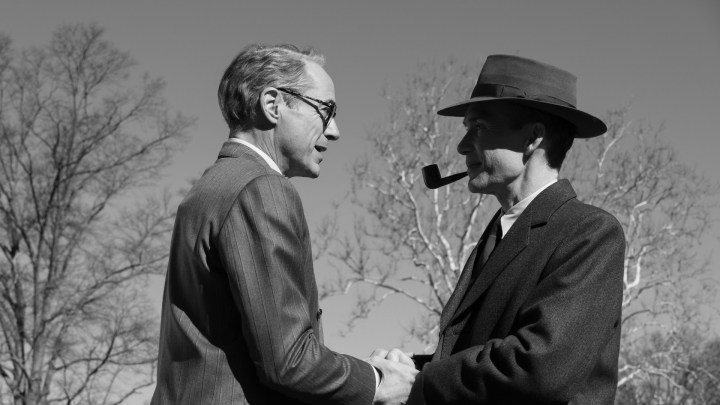
“Oppenheimer, an epic of creation, destruction, hubris, and lots of heady talk, proceeds with the relentless logic of a chain reaction.”
Pros
- The gripping procedural thrust of Nolan’s storytelling
- The staggering 70mm imagery
- Cillian Murphy’s grandly enigmatic performance
Cons
- The love stories aren’t as engaging
- There are a few moldy biopic conventions
- The last hour is a strange gear shift
The most chilling scene in Christopher Nolan‘s immense and haunting new three-hour drama, Oppenheimer, is the one where a group of men finalizes plans to drop the atomic bomb on Hiroshima and Nagasaki. By now, we’ve all heard the defenses of this abhorrent decision: how it ended the war; how it was the only way to get through to the Japanese; how, by the math of projected casualties, it may actually have saved lives. Yet we’ve never heard the decision rationalized so calmly by those making it, as though it were a matter of mere accounting, debated with hands un-wringed and brows unfurrowed. Eventually, one of the men casually rejects Kyoto as a potential target, sparing its thousands of civilians — and dooming thousands more — because the city held “cultural meaning to the Japanese.” Also, he once honeymooned there.
More than just the cold calculus of it all, what makes the conversation so disturbing is how it’s staged. These men, these destroyers of worlds, convene not in some ceremonial war room but in a small, cramped office, politely exchanging words from their perches on couches and chairs. And Nolan doesn’t particularly emphasize the significance of the scene. It arrives without fanfare or crescendo, not at the beginning or the end of the movie, not as a centerpiece, but as just another item on the timeline of events, the unbroken series of causes and effects the writer-director methodically traces.
Oppenheimer, an epic of creation, destruction, hubris, and lots of heady talk, proceeds with the relentless logic of a chain reaction. If you wanted to be cute, you could say it moves in particles and waves, as a fluid flood of atomized history, each scene flowing unstoppably into the next. Though the film marks Nolan’s first foray into the generally unremarkable field of biographical drama, it’s every bit as propulsive as his superhero and science-fiction movies. This time, there’s a particular moral dimension to the momentum: In its forever-churning montage, Oppenheimer evokes the unstoppable forward rush of scientific advance. That the film scarcely pauses for breath is an expression of its subject’s dedicated pursuit of how, unhindered by questions of if until it’s much too late.

The script covers a significant stretch of milestones in the life of J. Robert Oppenheimer (Cillian Murphy), from his 1920s youth as a promising, rebellious university student —his vindictive near-poisoning of a professor is an ominous early hint of how his brilliance can and will be weaponized — to his 1960s award-ceremony dotage as the revered Father of the Atomic Bomb. The bulk of the drama happens in between, on a helix of linked dilemmas: the race against the Nazis to develop the bomb and the way Oppenheimer’s almost casual interest in socialist politics threatened his influence.
Nolan, famed tinkerer of time, naturally offers a less than linear path through this dense 20th-century dossier. He has structured Oppenheimer like an Aaron Sorkin courtroom drama, only way knottier, weaving around two separate hearings — one a closed-door inquisition shot in full color, another a very public deposition shot in rich black-and-white. The film, as chronologically sophisticated as The Prestige, weaves in and out of these different chapters in Oppenheimer’s career; only those who have read the source material, the biography American Prometheus, might correctly ballpark the year at every juncture. At one point, Nolan takes us inside a flashback within a flashback within a testimony. Eventually, he brings the parallel timelines together.
There are elements familiar to the Great Man biopic. Nolan illustrates Oppenheimer’s blooming inspiration as flashes of chemical process — a more visually pleasing version of the disembodied grids of digits A Beautiful Mind deployed to the same end. The film also drifts periodically into Oppenheimer’s personal life, specifically the love triangle he forged with his wife, biologist Kitty (Emily Blunt), and his mistress, psychiatrist Jean Tatlock (Florence Pugh). Though it inspires the first sex scenes of Nolan’s filmography, including one that eccentrically repurposes the man’s famous quoting of Hindu scripture as foreplay, this material won’t dissuade those who insist that the filmmaker brings a chilly touch to matters of the human heart.
Certainly, he seems more engaged with the logistics of the Manhattan Project, which is depicted in Oppenheimer as a marshaling of conflicting personalities and grievances and skillsets. Can Nolan relate? At times, the Los Alamos Laboratory, constructed in the New Mexico desert, resembles nothing so much as a giant film set. Oppenheimer, director of a different sort, flits from department to department, city to city, circumventing jurisdictions, matching his team of big brains and bigger egos to different tasks. Nolan has, of course, assembled his own dream team, and a rather staggering cast list of famous faces to fill out even the minor roles. They’re more particles forming the waves of this dark vision, this monument to an experiment in death.
The nucleus of the movie is Murphy, in a performance of grand mystery and calculation. The actor is gaunt and iconic under a fedora. His sunken cheeks express the inward depression of Oppenheimer’s soul. His eyes blaze like the blue flames of an explosion, alternately conveying curiosity, ambition, and bottomless guilt. He is a mess of contradictions: dark but witty, thoughtful but arrogant, an introverted big thinker who becomes a rock star in magazines and at podiums, at once architect and mere instrument of human destiny. Nolan drinks all this in, through close-ups of sumptuous 65mm, shot on IMAX cameras. Not since The Master, perhaps, has a filmmaker used the large gauge to such intimate effect, making a vast canvas from one man’s troubled features.

No screen may be big enough for Oppenheimer‘s centerpiece attraction, the climax of all that feverish research, the desert test that cleaved history in half. Nolan recreated the explosion for real, sans the nuclear material, and it’s an awe-inspiring practical effect: an inferno of blinding light and eerie silence, chased by the deafening roar of the world’s loudest starting gun. It’s also the only moment of traditional spectacle in a $100 million blockbuster of middle-aged men debating quantum physics in drab rooms.
We never directly witness the horrific results of Oppenheimer’s achievement. There’s a queasy scene of moral revulsion, as the scientist addresses his team in the aftermath of victory, swallowing his growing unease, the frame literally quivering with the obscenity of the celebration. But Nolan does not take us to ground zero, to the before or after of the cities we leveled. It’s a strategic omission, an absence with purpose; leaving all that death and destruction unseen reflects the blinkered perspective of these men, making the theoretical actual while divorced from the consequences of their anti-human folly. The tragedy must happen offscreen.
The last hour of Oppenheimer will likely prove divisive. Rather than dwell on his subject’s ballooning sense of responsibility, Nolan gradually pulls together the dangling threads of those two parallel hearings, redirecting his focus to Oppenheimer’s waning stature in D.C., the status of his security clearance during the Red Scare, and his complicated relationship with Lewis Strauss (Robert Downey Jr., liberating himself from the snark, but not the arrogance, of Tony Stark). It’s complex, cleverly orchestrated political theater … which can’t help but seem insignificant compared to the matter of world-reshaping, world-collapsing power Oppenheimer unleashed. Who cares about Beltway infighting when there are mushroom clouds sprouting on the horizon?
Maybe that’s part of the point Nolan is making, though. Oppenheimer’s feat of science was a realization of the inconceivable — an event of unprecedented enormity, by all definitions of the word. Yet a decade later, it had already been rolled into the standard business and grudges of politics. Oppenheimer changed the world forever, but he couldn’t change Washington. And in the end, his terrible invention fell into the hands of people too indifferent to its power. In the opus of Oppenheimer, Nolan finds a dark vision of history as men gathered in small rooms, trifling with forces beyond their existential pay grade.
Oppenheimer opens in theaters everywhere Friday, July 21. For more of A.A. Dowd’s writing, please visit his Authory page.
Editors’ Recommendations

